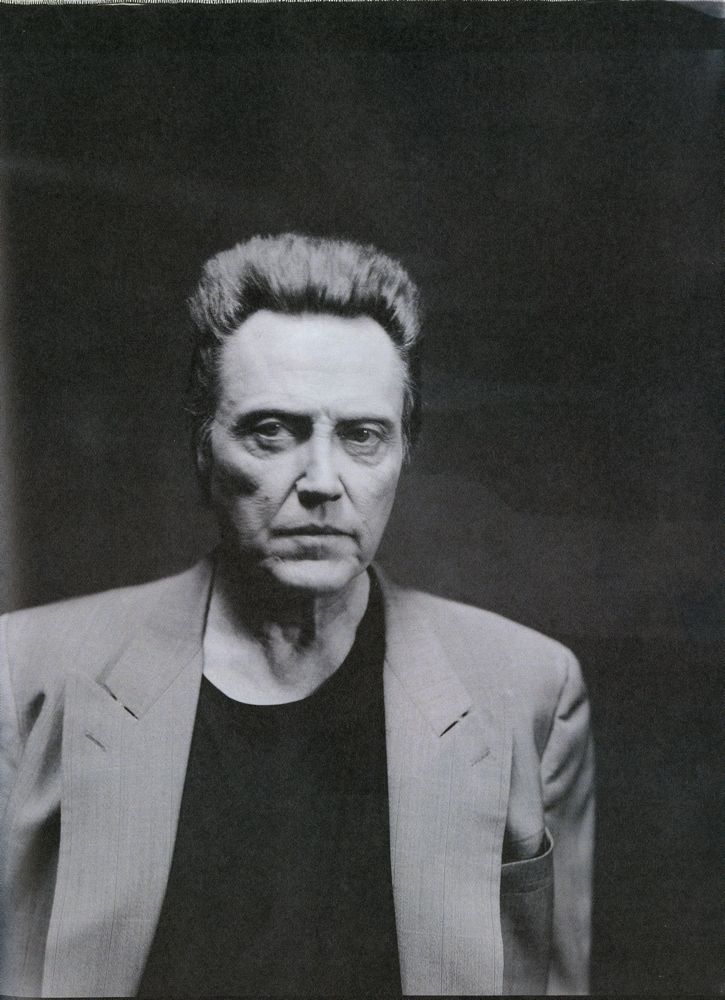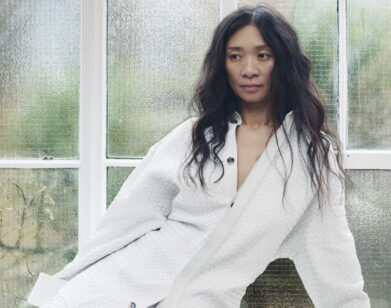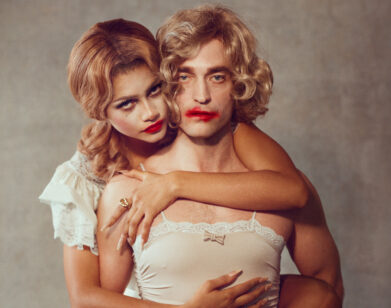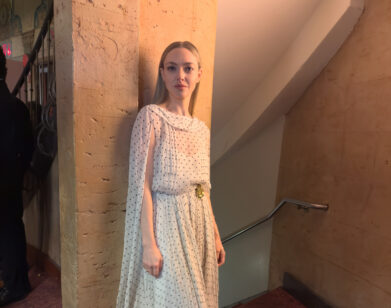Christopher Walken on Cats, Characters, and Career Highlights

CHRISTOPHER WALKEN IN INTERVIEW, JUNE 2004. PHOTO: JULIAN SCHNABEL.
Christopher Walken’s first Interview appearance was with Factory-fixture Tinkerbelle in our August 1977 issue. Then 34, Walken had just played Diane Keaton’s brother in Annie Hall, and was about to start filming Michael Cimino’s The Deer Hunter, for which he would win his first and only Academy Award. “Christopher Walken is an actor who stands unique and apart from other performers because he possesses a quality that can be best described as strange,” Tinkerbelle wrote. “His real turn-on is his gift for bringing his characters a sense of what is loosely defined as ‘off-the-wall,'” she continued.
Nearly 40 years later, and Walken’s air of oddity has made him a cult figure. With his signature halting cadence and tendency to play villains, Walken is perhaps the most imitated contemporary American actor.
This month, the Queens-raised actor stars alongside Jason Bateman, Nicole Kidman, and Maryann Plunkett in the dark dramedy The Family Fang. Like many of Walken’s characters, patriarch Caleb Fang is rather unsettling: one half of a cult performance artist couple who, just as he feels he is losing his touch, mysteriously disappears alongside his wife. Bateman, who also directed the film, and Kidman, who is one of the film’s producers, play Caleb’s two adult children, Baxter and Annie Fang. Annie is convinced that her parents are in hiding, safe and sound; Baxter isn’t so sure.
EMMA BROWN: Jason Bateman has talked about how working alongside you was exciting because you’re one of his heroes. Have you ever worked with one of your heroes?
CHRISTOPHER WALKEN: Oh sure. When you’re young, that happens. When you’re older, too. Often now when I work with people, terrific people, I’ve met them before and I know them a little bit. But when you’re young you come in and you’ve only seen them up there.
BROWN: I know you’ve been acting and dancing professionally since you were a child. Was there a moment where you felt like, “I can really call myself an actor now”?
WALKEN: I’m not sure I ever really thought about that. I became an actor kind of by accident. I was in musical theater and I got a job as an actor in a play and kept going. But I never set out to be an actor; it happened over time. A job leads to a job, just like anything else, and it became apparent that this was probably what I was going to keep doing.
BROWN: Was there one role in particular after which you were no longer asked to audition for roles?
WALKEN: Yeah, I suppose. Obvious things like The Deer Hunter. After that happened, the scripts got better. Opportunities happened.
BROWN: Was there a role after Deer Hunter that you really had to fight for?
WALKEN: I’ve never done that. You hear about actors going in and saying, “You’ve got to let me read for this!” I’ve never done that. Lots of parts I’ve wanted and didn’t get, but I think any actor would say that.
BROWN: Do you get over it quite quickly?
WALKEN: You have to. There’s really nothing else to do about it.
BROWN: You’ve said that if you were a director and an actor asked you what they should do, you would just say, “Do whatever you want,” which isn’t what you want your director to say to you.
WALKEN: I might have been being silly. It’s true that I don’t think I’d be a good director. If I were a director, I’d try to hire the best people I could and then leave them alone. I don’t know much about cameras or lighting, so I’d make sure that I had a really good cameraman who understood lenses and lighting, and I say to him, “This is the scene we have to shoot and this is what I think it should be, you go do it.” Same with actors. But really, very good directors who know everything do basically the same thing. They hire you and then they leave you alone.
BROWN: Is that what generally happens to you now?
WALKEN: When it’s a happy experience, yes. There’s not a lot of talking between actors—either between actors or between actors and directors. People think that they sit in rooms and talk about psychology and motivations. I don’t think that happens much. All actors do what they do differently, and it doesn’t matter.
BROWN: I was reading some of your old interviews, and you said that you were more of an extrovert on stage than in front of the camera. Do you still feel like that’s true?
WALKEN: I think that’s probably true. The stage is where I grew up. Not only that, I grew up in music theater playing to the audience—singing and dancing and showing off. That’s really my background. But the camera’s different. I think I’m more at home on stage.
BROWN: What was your favorite musical as a child?
WALKEN: I was in a lot of them. When I was a teenager and all these shows were on I was in that business, so I knew a lot of people in the theaters and I saw many of the great shows many times. I would go in and stand in the back—they would let me in, they knew me. I saw Fiddler on the Roof, A Funny Thing Happened on the Way to the Forum, Gypsy, and Funny Girl many times just standing in the back. When I was in high school, the original production of She Loves Me opened. I must’ve seen that six times. There’s a new production here on Broadway now that got very good notices. Have you ever seen She Loves Me? I think you’d like it a lot. It’s a wonderful American musical. I still like to go to musicals.
BROWN: Have you seen Hamilton?
WALKEN: No, I haven’t. That’s a hard one to get in.
BROWN: You’ve said that you don’t want to make another movie in the jungle, that you’ve made enough films in the jungle. Are there any other places you’d like to avoid?
WALKEN: It’s true. There are places I don’t want to go. Making movies on tops of mountains, in the desert, playing scenes while icy torrents of rivers rush by. The jungle. It’s very uncomfortable. I want to make movies on a soundstage. They close the door and it’s nighttime, daytime. If it has to rain, they make the rain. That’s what I like.
BROWN: I know they spelled your name wrong in the credits of Annie Hall, and in Heaven’s Gate, there’s a scene when you’re talking with Mickey Rourke and they forgot to dub out a line.
WALKEN: It’s a night scene, so it’s hard to see our lips. We were shooting—I think it was four o’clock in the morning—and he and I had to go from the barn to the house, and we passed this photographer’s thing. Authentic. And Mickey said to me, “What’s that?” And I said, “I think it’s a flying saucer.” It’s in the movie if you listen. Anybody watching the movie’s not going to notice, but if I say, “Listen closely, right here.” They’ll say, “Oh yeah, something about a flying saucer.”
Of course they may have corrected it by now, but the original titles at the end of Annie Hall say “Christophe Vlaken.” It was just inconceivable. These things are checked…I don’t know what that was about. I’d never seen or heard of it. How they came up with the name Christophe Vlaken, it must’ve been a conspiracy. I did ask about it but nobody knew.
BROWN: We spelled Jack Nicholson’s name wrong on the cover in the ’70s.
WALKEN: Was he already famous?
BROWN: Pretty famous. It was 1974.
WALKEN: Yeah…no fact-checking in those days. “Christoph Vlaken, the great Romanian actor.”
BROWN: Did you ever use that as a pseudonym?
WALKEN: [laughs] No.
BROWN: You’ve said in the past that if there were different schools of acting, you’d be an abstract actor.
WALKEN: I know. I said that a long time ago. Not sure what I meant.
BROWN: Do you still have Muhammad Ali’s boxing shorts?
WALKEN: I do. 1972. I got them for $40 at an auction. Nobody wanted them. I have them framed in my house. I have a little room. It’s tiny, but it’s got a lot of stuff in it—backstage passes to rock concerts, that sort of thing. The Stones, Aerosmith, Elton John.
BROWN: Do you keep things from the movies you work on?
WALKEN: Lots of stuff. Usually a souvenir. Sometimes they let me keep some of the clothing.
BROWN: You’ve also said that you felt you never really played a character that was like you. Do you still feel that way?
WALKEN: A little bit. I play so many villains and strange, troubled people. I don’t have that kind of life. I live in the country. I’ve been married nearly 50 years. I have a cat.
BROWN: Bowtie?
WALKEN: [laughs] I make up different names for my cat all the time—Flapjack, Bowtie, Popcorn. But he’s really, “Hey you, cat.”
BROWN: Do you still write?
WALKEN: Yeah. I have boxes full of stuff. Most actors do have a trunk full of stuff, paintings or scripts. It never comes to anything.
BROWN: Do you ever show it to anyone?
WALKEN: I do. No enthusiasm. I suppose in order to succeed at something you have to be very persistent. I’ve never done that. If I show somebody something that I’ve written and they say, “Eh…alright,” I just put it away and I never show it to anyone again. But I know people who won’t take no for an answer, and eventually someone pays attention.
BROWN: Do people ever show you their scripts? Do you give them honest feedback?
WALKEN: It takes a very long time to read a script. I’ll look at a script, but there are so many scripts. I remember once being at the dentist, and the guy was doing my teeth and telling me about the screenplay he’d written and he said, “Will you read it?” And I said [unenthusiastically] “Oh…okay.” And it turns out that it was about a dentist! [laughs] It’s very hard to get a movie made. You could spend your life reading scripts that never got made.
BROWN: Was that in L.A.?
WALKEN: No, it was here in New York.
BROWN: What’s the strangest thing a fan has sent you?
WALKEN: I get a lot of invitations, and sometimes it’s far away, it’s in Montana or something. “We’d like you to come to our daughter’s wedding.” These are people I’ve never heard of. I get a lot that. “Will you come to my son’s graduation?” No…I guess when you’re in stuff, it’s almost a feeling that they know you. I also get letters saying, “Could you please send me 100,000 dollars right away. I really need it.” Lot of that. I don’t know what they’re thinking. I do read them. I save some of them.
BROWN: Have you ever been tempted to call someone’s bluff and show up at their wedding?
WALKEN: No… But it’s interesting how often that happens.
THE FAMILY FANG IS CURRENTLY SCREENING AT THE TRIBECA FILM FESTIVAL AND WILL BE RELEASED ON APRIL 29, 2016 IN NEW YORK.






